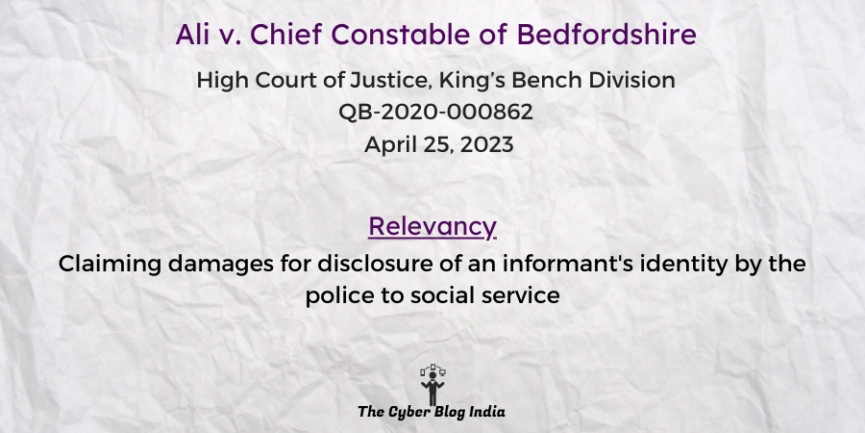Ali v. Chief Constable of Bedfordshire

Ali v. Chief Constable of Bedfordshire
[2023] EWHC 938 (KB)
In the High Court of Justice, King’s Bench Division
Case Number QB-2020-000862
Before Justice Chamberlain
Decided on April 25, 2023
Relevancy of the case: Claiming damages for disclosure of an informant’s identity by the police to social service
Statutes and Provisions Involved
- The General Data Protection Regulation 2018 (Article 5, 6)
- The European Convention on Human Rights 1950 (Article 8)
- The Human Rights Act 1998 (Section 6)
- The Computer Misuse Act 1990 (Section 1)
- The Children Act 1989 (Section 11)
Relevant Facts of the Case
- On March 01, 2019, the claimant anonymously called Bedfordshire Police to report that her ex-husband was dealing drugs and posed a risk to her and her children. She had explicitly stated that she did not want to be identified as the source of the information.
- A police officer met her and made a report, noting that she was “frightened of repercussions from speaking to the police.”
- The police passed the report to Luton Borough Council’s Social Services Department. Here, an employee was in a relationship with Ali’s ex-husband. She unlawfully accessed and shared the report with him.
Prominent Arguments by the Counsels
- The claimant’s counsel argued that the police had assured the claimant that her identity would not be disclosed. The police breached this assurance by sharing her identity with Luton Borough Council. Moreover, the police failed to establish that revealing the claimant’s identity was necessary as a source of information. Furthermore, they did not undertake any balancing exercise to weigh the necessity of disclosing the claimant’s identity against her right to privacy.
- The defendant’s counsel submitted that the claimant had no reasonable expectation that the police would not pass her identity to Luton Borough Council. The police had an obligation to protect the claimant and her children. This necessitated sharing her identity as the source to assess the information’s credibility and risk level. Redaction and anonymisation of the same would affect its quality and the council’s response.
Opinion of the Bench
- The police breached the General Data Protection Regulation by disclosing the claimant’s identity as a source without considering the necessity.
- The claimant reasonably expected privacy regarding her identity as the source. The disclosure of the same was an unjustified interference with her right to privacy.
Final Decision
- The court granted damages in the claimant’s favour amounting to £3,000.
